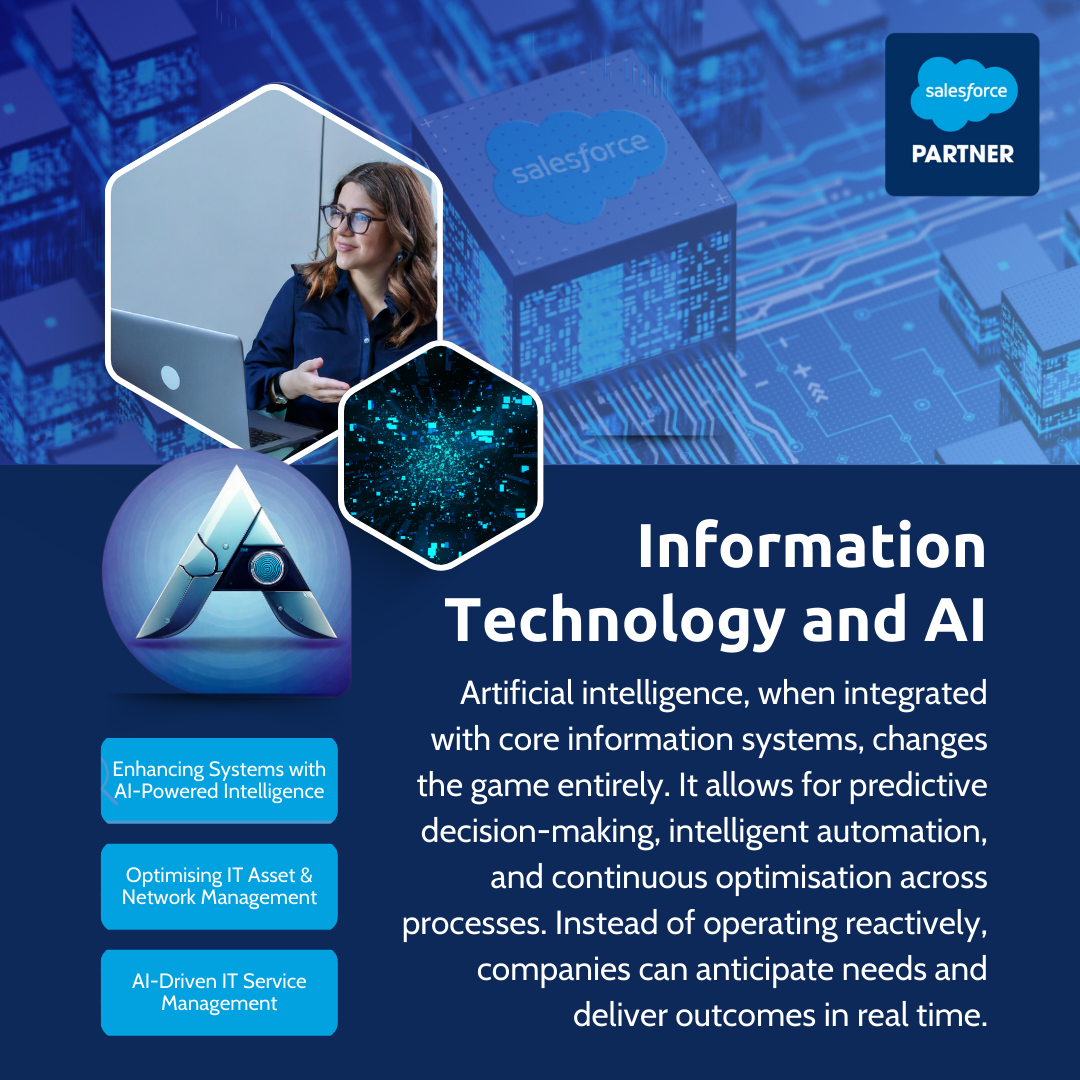
As speed, accuracy, and personalised experiences increasingly define success, the convergence of information technology and AI is emerging as a critical pillar of operational strategy. Organisations are no longer just exploring AI—they are embedding it deeply into their infrastructure to remain competitive and agile. This is driven by the need to deliver faster services, make smarter decisions, and customise offerings at scale. As organisations expand, they face mounting pressure to scale capabilities without escalating costs, making AI necessary.
Artificial intelligence, when integrated with core information systems, changes the game entirely. It allows for predictive decision-making, intelligent automation, and continuous optimisation across processes. Instead of operating reactively, companies can anticipate needs and deliver outcomes in real time. This kind of operational transformation underscores why the fusion of information technology and AI is one of the most defining trends in enterprise innovation today.
Salesforce’s Integration of Information Technology and AI
Rather than treating AI as an external tool, Salesforce builds it directly into its platform. This integration empowers organisations to automate processes, gain actionable insights, and personalise customer experiences—all from within a single unified environment. Organisations leveraging Salesforce’s AI capabilities find themselves equipped with tools that transform how work is done at every level.
The embedding of AI enhances operational efficiency while also fostering agility and scalability. With automation managing routine tasks and intelligence driving decisions, teams can focus on innovation and value creation.
Enhancing Enterprise Systems with AI-Powered Intelligence
AI-driven predictive analytics have become a main aspect of Salesforce’s value proposition. By analysing historical trends, Salesforce Agentforce can forecast sales outcomes, customer churn risks, and support case resolution times. This foresight enables companies to shift from reactive operations to proactive strategies, identifying potential issues before they arise and capitalising on opportunities faster than ever.
Beyond forecasting, automation is transforming daily operations. Sales teams benefit from AI-generated call logs and pipeline updates, while service agents receive recommendations based on historical resolution success. Even marketers enjoy AI-curated content and segmented audience insights. These capabilities illustrate how information technology and AI, when intertwined, free up valuable time and elevate the quality of work across every function.
Ethical AI and Responsible Innovation
As AI becomes more embedded in enterprise systems, more ethical considerations must be contemplated. Salesforce has built safeguards into its AI architecture with the Einstein Trust Layer, which ensures that data privacy, auditability, and toxicity filtering are embedded throughout the CRM. This allows organisations to deploy AI solutions with confidence, knowing that compliance and user safety are actively maintained. Trust and transparency are no longer optional—they are essential components of any modern AI strategy.
Salesforce also leads the charge in mitigating bias in AI models. Through bias detection processes, internal review boards, and algorithm transparency tools, the platform ensures that decision-making remains fair and accountable. In a world increasingly shaped by information technology and AI, responsible innovation becomes just as important as technical capability. Salesforce’s efforts set a high standard for what ethical AI implementation should look like.
AI in IT Governance and Cybersecurity
With Salesforce, organisations can automate regulatory checks, monitor for anomalies, and generate audit trails in real time. This proactive approach reduces the burden on IT teams and ensures alignment with evolving compliance frameworks. The integration of information technology and AI empowers companies to manage risk with greater accuracy and foresight.
Cybersecurity also benefits from this fusion. AI tools constantly monitor network activity to detect unusual behaviour patterns, allowing organisations to neutralise threats before they escalate. These adaptive defence mechanisms enhance resilience and protect sensitive data. As cyber threats become more complex, the role of AI in securing IT infrastructure becomes increasingly critical to maintaining trust and continuity.
Optimising IT Asset and Network Management
Managing IT assets effectively is key to sustaining operational efficiency. Salesforce’s AI tools enable real-time tracking of equipment, predictive maintenance schedules, and intelligent resource allocation. By embedding artificial intelligence into information systems, companies can reduce downtime, improve asset utilisation, and make informed decisions about future investments in infrastructure.
The same applies to network optimisation. AI dynamically adjusts network parameters in response to changes in traffic and usage, ensuring uninterrupted performance. It also identifies vulnerabilities and adapts defences in real time. These capabilities demonstrate how information technology and AI can work in harmony to streamline digital operations and safeguard enterprise networks from disruption.
AI-Driven IT Service Management (ITSM)
Through Salesforce’s Einstein GPT, organisations can forecast service demand, allocate resources efficiently, and provide real-time support. AI-powered chatbots handle routine requests, enabling IT staff to focus on more complex issues. This integration of information technology and AI transforms the speed and quality of service delivery.
Beyond automation, AI analyses service desk trends to uncover inefficiencies and areas for improvement. This continuous feedback loop supports smarter decision-making and helps maintain high service levels. As organisations become increasingly reliant on IT services, the fusion of information technology and AI ensures that support systems are both agile and resilient.
AI in Data Centre Energy Optimisation
Data centres are among the most energy-intensive parts of IT infrastructure, but AI offers solutions for better energy efficiency. By analysing data on workloads, environmental conditions, and equipment usage, AI can optimise cooling systems and manage power distribution. Salesforce’s AI capabilities support greener IT practices, making sustainability a core part of digital transformation strategies.
These intelligent systems reduce waste, lower costs, and ensure consistent performance under variable loads. As organisations aim to reduce their carbon footprints, the role of AI in managing energy consumption will grow. The intersection of information technology and AI presents an opportunity not only for improved operations but also for meaningful environmental impact.
The Future of Information Technology and AI
Looking ahead, the relationship between information technology and AI will only deepen. Salesforce continues to invest in AI research, with advancements in natural language processing, intelligent agent collaboration, and industry-specific large language models. These innovations will provide enterprises with even more powerful tools to transform their systems, services, and customer experiences. The ultimate goal is a unified digital environment where AI informs every decision and streamlines every action. Salesforce’s vision places AI at the core of enterprise strategy, ensuring that organisations are not just prepared for the future but actively shaping it.




